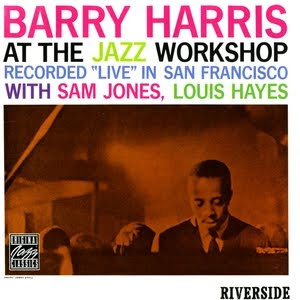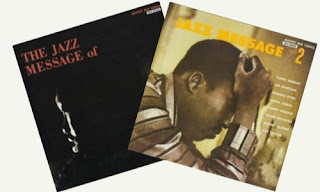Hank Mobley 1956 - The Jazz Message of HM v1-2 (1956)
jazz | 2cd | eac-flac-cue-log-cover | 330MB
Savoy | Denon remaster | rar +5% recovery
AMG:
v1__Other than a Blue Note date from the previous year, this CD contains tenor saxophonist Hank Mobley's first two sessions as a leader. With trumpeter Donald Byrd, either Hank Jones or Ronnie Ball on piano, Wendell Marshall or Doug Watkins on bass, drummer Kenny Clarke and (on three numbers) the unusual altoist John LaPorta, Mobley performs a mixture of originals and standards. The results (highlighted by "There'll Never Be Another You," "When I Fall in Love" and "Budo") are a swinging hard bop date. Nothing all that unusual occurs and the CD clocks in at an average LP's length but the swinging music is easily recommended to straight-ahead jazz fans and (unlike many of Denon's Savoy reissues), these two sessions are brought back complete.
v2__Impressive lineups, both in the front line and the rhythm section, fuel the two 1956 sessions on this Savoy reissue.
The players are committed, the writing is good, and the performances reward repeated listening. The result is a worthwhile precursor to the industry-standard hard bop Mobley would later record for Blue Note.Lee Morgan, then 18, joins Mobley on two tracks that have pianist Hank Jones, bassist Doug Watkins, and drummer Art Taylor in the rhythm section. Even if Morgan at this time was audibly still growing as a trumpet player, his poise, execution, and resourceful imagination were already the tools of a master. Donald Byrd, on form and playing with crispness and authority, moves into the trumpet chair for the three remaining tracks. This time it's Barry Harris on piano, Kenny Clarke on drums, and Watkins (again) on bass. The influence on Mobley of swing era tenors, from Lester Young to Illinois Jacquet, can be clearly heard on these tracks. Mobley's respect for and understanding of the pre-bebop style serve him well in his contribution to the development of the predominant jazz style that followed bebop. In addition to three Mobley originals, there is a blues by Thad Jones and another from Watkins. The standout track is Mobley's "Space Flight," a bright, up-tempo bop number that has memorable solos from Mobley, Byrd, Harris, and Clarke. The recording on this CD is very good but, as is common on Savoy reissues, the running time isn't long -- 32 minutes in the case of this jazz message.
v1
Tracks:
1. "There Will Never Be Another You" (Gordon, Warren) - 5:50
2. "Cattin'" - 4:38
3. "Madeline" - 4:42
4. "When I Fall in Love" (Heyman, Young) - 3:47
5. "Budo" (Davis, Powell) - 7:32
6. "I Married an Angel" (Hart, Rodgers) - 7:00
7. "The Jazz Message (Freedom for All)" (Cadena) - 8:01
Personnel:
* Hank Mobley: tenor saxophone
* Donald Byrd: trumpet
* Ronnie Ball: piano (tracks 1-4)
* Horace Silver: piano (tracks 5-7)
* Doug Watkins: bass (tracks 1-4)
* Wendell Marshall: bass (tracks 5-7)
* Kenny Clarke: drums
* John LaPorta: alto saxophone (tracks 5-7)
v2
Tracks:
1. "Thad's Blues" (Jones) - 9:48
2. "Doug's Minor B' Ok" (Watkins) - 6:40
3. "B. for B.B." - 6:31
4. "Blues Number Two" - 5:00
5. "Space Flight" - 4:15
Personnel:
* Hank Mobley: tenor saxophone
* Lee Morgan: trumpet (tracks 1 & 2)
* Donald Byrd: trumpet (tracks 3, 4 & 5)
* Hank Jones: piano (tracks 1 & 2)
* Barry Harris: piano (tracks 3, 4 & 5)
* Doug Watkins: bass
* Art Taylor: drums (tracks 1 & 2)
* Kenny Clarke: drums (tracks 3, 4 & 5)
rc






























